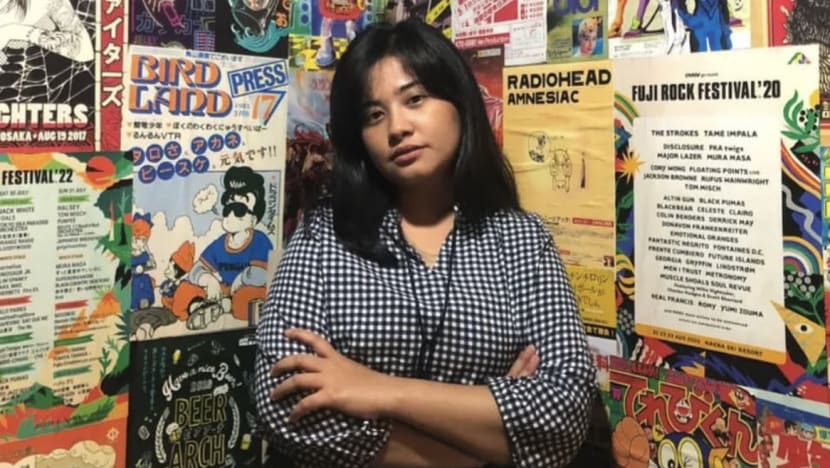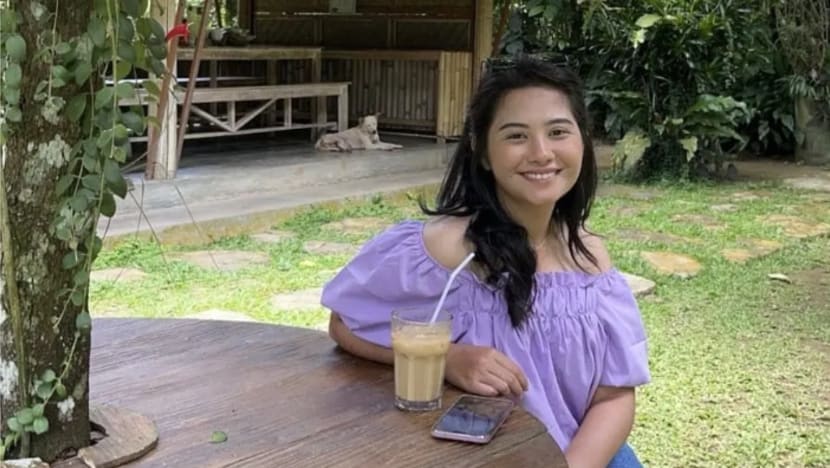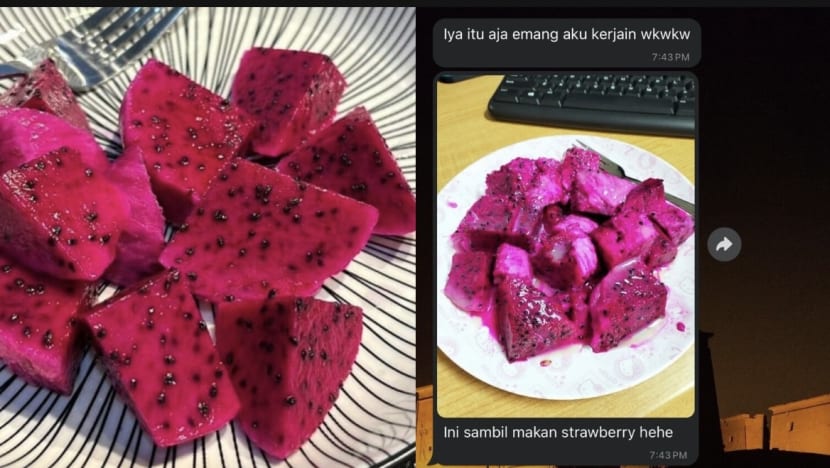Dragon fruit photos a red flag? How this Indonesian woman helps others avoid love scams
Helinsa Kaban started the Safe Dating Space network to help women wise up to swindlers on dating apps, and support love scam victims. The WhatsApp community has grown to over 500 members across Indonesia.

Helinsa Kaban founded the Safe Dating Space community in Indonesia. (Photo: Instagram/@helinsakaban)

This audio is generated by an AI tool.
JAKARTA: In hopes of finding her soulmate, Helinsa Kaban turned to a dating app three years ago and soon found a match.
Their conversation shifted to WhatsApp, but Helinsa “immediately felt something was off with this guy”.
The man readily sent her a copy of his identity card – which she said was likely fake – in an effort to gain her trust. He also shared sob stories about his life, claiming to have been abandoned by his wife.
“It’s impossible to just meet someone and immediately give your identity card. He was also dwelling on his sob story, saying that he was just divorced,” reasoned Helinsa, 30, who is also known as Elin.
She conducted an image analysis of the man’s profile photo and found out that it was likely stolen from a male model from the Philippines. A phone number search revealed the man was actually from Malaysia and had a completely different name.
“I immediately decided to end the relationship,” said Elin, a marketing manager at a tech company.
While she was fortunate enough to avoid falling prey to a love scam, many other women in Indonesia have lost hundreds of millions in rupiah to such deceptive schemes.
Determined to raise awareness about the issue, Elin established the Safe Dating Space community in November last year.
The group has grown to over 500 members across the country, with the women ranging in age from 25 to 47.
Operating through WhatsApp, the community provides a safe space to share tips on staying vigilant while fostering a sisterhood of love scam survivors.
Her story is part of a series on everyday heroes on CNA’s Bahasa Indonesia site. Others who have been featured include a man who rescues abandoned babies and set up a welfare home, as well as an animal lover who feeds and looks out for stray cats.“IS THIS GUY A SCAMMER OR NOT?”
Elin began exploring dating apps in 2022 after she decided to move on from her previous relationship, which lasted about 4.5 years. She soon realised that not everyone on these apps was truthful; some were outright scammers.
After learning about various tactics employed in romance scams, Elin began sharing her experience on TikTok last year. Her posts drew a wave of comments, with many asking whether the men they had met on dating apps might be scammers.
“I received a lot of private messages asking ‘is this guy a scammer or not?’ I responded to some but I’m not on TikTok all the time. A few also shared that they had already fallen victim,” Elin said.
The Safe Dating Space community offers a better platform to respond to these questions, she said.
“All the members are women, but not all are scam victims. Many of them joined just to learn about common scams and how to avoid them,” she said.

Those interested can sign up through Instagram, but not all applicants will be immediately added to the WhatsApp channel as it takes time to verify each request.
“We also have to make sure the anti-scam group is not infiltrated by scammers themselves,” Elin explained.
In the WhatsApp group, members regularly share about the scams they have encountered on dating apps and some report having lost substantial sums of money.
“Based on what I’ve gathered, total losses reported by members could be as high as 3 billion rupiah (US$178,014). Some women lost 250 million or even 300 million rupiah each. It’s worrying,” said Elin.
The group has helped save some of its members from being fleeced. For instance, a woman from Papua said she would have lost about two million rupiah had she not learned about scam tactics through the community.
The woman thanked Elin for helping her avoid the loss, but to Elin, “it’s not about the amount (but) the fact that what I’m doing is making a difference to someone else”.
While most interactions within the Safe Dating Space community happen online, the group has organised physical gatherings that have drawn dozens of participants. At least four in-person gatherings have been held, twice in Jakarta and once in Bandung and Palembang.

COMMON SCAM TACTICS REVEALED
While scammers tailor their tactics to each potential victim, often conducting profiling to determine the most effective method to use, Elin has observed some common ploys.
One such method is what she calls the “Lisbon and Macau” tactic, where perpetrators claim to have encountered trouble while on a work assignment in Lisbon or Macau, and say they urgently need money transfers.
Another common scam tactic, she said, involves individuals impersonating military doctors allegedly assigned by the United Nations to conflict zones, or claiming to be professionals in industries like mining and oil.
These scammers would claim they have bought something for the victims and request that funds be transferred to pay for taxes on the purchase.
There are also many scammers who invite their victims to join online gambling games as well as business investments involving stocks and cryptocurrencies.
“They invite them to join trading and claim to be insiders who know when the prices (of stocks and crypto) are low,” said Elin.
She and other members of the community have tried tracking a victim’s transactions, which led to a scammer’s crypto wallet.
With experience in the crypto industry, Elin said cryptocurrency transactions, such as for Bitcoin or Ethereum, are permanently stored on the blockchain and can be viewed by anyone with the crypto wallet address, although the owner’s identity remains unknown.
Elin’s efforts to track down some perpetrators have led to the discovery that they are in Cambodia, a country in which online scam syndicates perpetrating love scams, online gambling operations and money laundering are known to operate.
“Based on the data we tracked, love scam operators are prevalent there (in Cambodia),” she said.
TIPS TO BECOME WISER TO SCAMS
With the combined experience of the community, Elin has become well-versed in ways to investigate whether one’s match on dating apps is a scammer.
One of the most effective ways, she said, is to analyse their profile pictures.
“We can do a reverse image search to find out who they really are,” Elin said, adding that community members would also help one another by doing online photo searches using various apps.
In one instance, they discovered that a photo used was not of an Indonesian but someone from another country.
Some would-be Romeos even used artificial intelligence (AI) during video calls. “If you want to know if they are using AI or not, pay attention to how they sit (during the call). If they sit stiffly like they are staring at a laptop, it means they are using AI,” advised Elin.
In such situations, Elin said “being suspicious is necessary”, especially if the photos and videos are “too good to be true”.
“The world is not like a Cinderella story, we must be able to control ourselves and manage our expectations,” she said.
Another scam tactic involves perpetrators sending photos of their daily activities, she said.
Interestingly, photos of dragon fruit are commonly sent by scammers to their victims.
Elin first learned about this after a member of the Safe Dating Space network shared a “daily life” photo sent by a man on a dating app. One of the photos was of dragon fruit – presumably to give the impression that the sender leads a healthy lifestyle, she said.

“Other members (in the network) claimed that they had received the same photo and after I posted (about this trend) on my TikTok, many people started commenting that they received similar photos too.”
Besides dragon fruit, scammers also commonly send photos taken at airports or in cars.
“It seems like although the scammers may be different, they have one shared database of photos and videos,” Elin said.
Another tip, she said, is to pay attention to the pace of how a relationship develops. If the person appears to be rushing and excessively dwelling on their sadness, it is a “red flag”.
“If you start seeing these signs, don’t brush it off, just leave (the conversation) immediately. Don’t be afraid, the heartbreak can heal in two or three days,” she said.
“SISTERHOOD” IN THE AGE OF DATING APPS
The community has evolved into a support network, “a sisterhood for single women navigating love and relationships, especially in the age of dating apps”, said Elin.
Through conversations with members, Elin has learnt that it is often older individuals who are most vulnerable to dating app scams. They could be single, previously married or single mothers.
Many of them are longing for companionship or facing social pressure to settle down, and scammers are highly aware of their potential victims’ emotional state, she said.
The women are often financially stable, making them even more appealing as victims.
“(The women) are more likely to be swayed by sweet talk,” Elin said, adding that the scammers would often use fake or AI-generated photos to appear more convincing.
“Some even go as far as sending flowers, buying coffee or surprising them with breakfast in an effort to win their trust,” she said.
Scam victims are often blamed by the people around them, she said. “They’re shamed with words like ‘You are old enough to know better’ or blamed by their families. So many of them suffer in silence and some have even attempted suicide."
This trend prompted her to create a separate support group for women who have been previously married or have survived domestic violence. Called Rise and Heal, it is a space for the women to offer one another emotional support, she said.
While some of these victims have reported their cases to the police, Elin said there has been little or no follow-up.
Looking ahead, Elin hopes the Safe Dating Space community will continue to grow and expand its efforts in educating people about love scams.
She hopes to one day create a mobile application that serves as a safe space for women to share their experiences without judgment, and for mutual support as they search for a life partner, especially online.
“We are on this journey together. Stay cautious and stay positive,” Elin said.
There have certainly been moments of joy in the community.
“When someone finds their soulmate, we all get very happy, the whole group gets emotional,” said Elin.






















